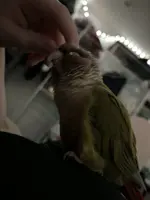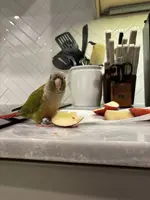I’ve had my green cheek conure for a couple years now and he is very bonded to me and sweet and cuddly, but recently he will randomly attack my face with extreme force, biting me hard and making me bleed. I am considering rehoming him if this can’t be fixed, because I leave him in his cage whenever I am home now most days simply because I’m scared to be around him now.
I am trying to figure out why he is doing this and how to correct the behavior but I am really stumped here.
I got him as a baby and though he was a little nippy at first, i got him to stop biting me and we were inseparable for a long time, I taught him to give me kisses which is what I think triggered his new behavior. Now, we will be hanging out together as usual and I’ll be petting him (no signs of aggression at all), and he will randomly and very quickly bite into my mouth very hard and won’t let go until I pry him off. This is very painful and it’s starting to become more, the other day he attacked me as I was walking into my house; he flew at my face and bit my neck very hard and made me bleed. I always wrap him in a towel or my sleeve/shirt immediately and put him into his cage when this happens. I am really at the end of my patience with this since it’s been going on for a couple months now. I thought that immediately putting him into his cage would deter him but it’s only getting worse. Has anyone else experienced this? This is so upsetting for me because we used to do everything together and now I don’t even feel comfortable napping while he is free in the house.
I am trying to figure out why he is doing this and how to correct the behavior but I am really stumped here.
I got him as a baby and though he was a little nippy at first, i got him to stop biting me and we were inseparable for a long time, I taught him to give me kisses which is what I think triggered his new behavior. Now, we will be hanging out together as usual and I’ll be petting him (no signs of aggression at all), and he will randomly and very quickly bite into my mouth very hard and won’t let go until I pry him off. This is very painful and it’s starting to become more, the other day he attacked me as I was walking into my house; he flew at my face and bit my neck very hard and made me bleed. I always wrap him in a towel or my sleeve/shirt immediately and put him into his cage when this happens. I am really at the end of my patience with this since it’s been going on for a couple months now. I thought that immediately putting him into his cage would deter him but it’s only getting worse. Has anyone else experienced this? This is so upsetting for me because we used to do everything together and now I don’t even feel comfortable napping while he is free in the house.


